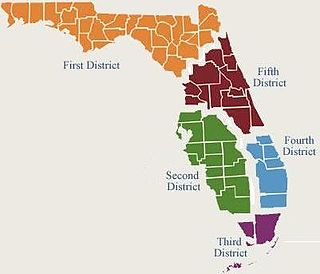The Kentucky District Courts are the state courts of limited jurisdiction in the U.S. state of Kentucky.
The Kentucky District Courts are the state courts of limited jurisdiction in the U.S. state of Kentucky.
The District Courts are trial courts of limited jurisdiction that hear misdemeanor criminal cases, traffic violations, violations of county and municipal ordinances and small claims. [1] They also have concurrent jurisdiction with the family court division of the Circuit Court over proceedings involving domestic violence and abuse, the Uniform Parentage Act and Uniform Interstate Family Support Act, dependency, child abuse and neglect, and juvenile status offenses.
Appeals from decisions of the District Courts are made to the corresponding Circuit Court for that particular district. Further appeals can be made on a discretionary basis to the Kentucky Court of Appeals as well as the Kentucky Supreme Court.

A court of appeals is an appellate court generally.
Circuit courts are court systems in several common law jurisdictions. The core concept of circuit courts requires judges to travel to different locales to ensure wide visibility and understanding of cases in a region. More generally, the term may also refer to a court that merely holds trials and other proceedings at a series of multiple locations in some kind of rotation.
The term Army in the Imperial Japanese Army was used in a different ways to designate a variety of large military formations, corresponding to the army group, field army and corps in the militaries of western nations.

The district courts of appeal (DCAs) are the intermediate appellate courts of the Florida state court system. There are currently five DCAs:

The Superior Court of the District of Columbia, commonly referred to as DC Superior Court, is the trial court for the District of Columbia, in the United States. It hears cases involving criminal and civil law, as well as family court, landlord and tenant, probate, tax and driving violations. All appeals of Superior Court decisions go to the District of Columbia Court of Appeals.

Motos is an arcade game that was released by Namco on September 20, 1985. It runs on Namco Super Pac-Man hardware but with a video system like that used in Mappy, The Tower of Druaga, Grobda and Dig Dug II.

William McKendree Springer was a United States Representative from Illinois.
The Texas Courts of Appeals are part of the Texas judicial system. In Texas, all cases appealed from district and county courts, criminal and civil, go to one of the fourteen intermediate courts of appeals, with one exception: death penalty cases. The latter are taken directly to the Texas Court of Criminal Appeals, the court of last resort for criminal matters in the State of Texas. The highest court for civil and juvenile matters is the Texas Supreme Court. While the Supreme Court (SCOTX) and the Court of Criminal Appeals (CCA) each have nine members per the Texas Constitution, the sizes of the intermediate courts of appeals are set by statute and vary greatly, depending on historical case filings and so that the justices on each court can timely adjudicate the volume of cases regularly before them. The total number of intermediate appellate court seats currently stands at 80, ranging from three, four, six, seven, nine, and thirteen (Dallas) per court.

The United States District Court for the Middle District of Tennessee is the federal trial court for most of Middle Tennessee. Based at the Estes Kefauver Federal Building and United States Courthouse in Nashville, it was created in 1839 when Congress added a third district to the state. Tennessee—along with Kentucky, Ohio, and Michigan—is located within the area covered by United States Court of Appeals for the Sixth Circuit, and appeals are taken to that court.
The Ohio District Courts of Appeals are the intermediate appellate courts of the U.S. state of Ohio. The Ohio Constitution provides for courts of appeals that have jurisdiction to review final appealable orders. There are twelve appellate districts, each consisting of at least one county, and the number of judges in each district varies from four to twelve. Each case is heard by a three-judge panel. There are currently 69 courts of appeals judges as provided by statute. A court of appeals judge is an elected position, with a term of six years. The Ohio Supreme Court has the discretion to review cases from the courts of appeals, but generally the appeals process in Ohio ends with the decision of the court of appeals.

The Florida circuit courts are state courts, and are trial courts of original jurisdiction for most controversies. In Florida, the circuit courts are one of four types of courts created by the Florida Constitution.
Oregon's circuit courts are general jurisdiction trial courts of the U.S. state of Oregon. These courts hear civil and criminal court cases.
In the Nevada state court system, the Nevada District Courts are the trial courts of general jurisdiction, where criminal, civil, family, and juvenile matters are generally resolved through arbitration, mediation, and bench or jury trials.
The Kentucky Circuit Courts are the state courts of general jurisdiction in the U.S. state of Kentucky.

The South Carolina Circuit Court is the state court of general jurisdiction of the U.S. state of South Carolina. It consists of a civil division and a criminal division.
WHO Expert Committee on Biological Standardization is a functioning body of World Health Organization. The Expert Committee has been meeting annually since 1947.
Wyoming District Courts are the state trial courts of general jurisdiction in Wyoming.
The West Virginia Circuit Courts are the West Virginia state trial courts of general jurisdiction. They are the only state trial courts in West Virginia that are courts of record. West Virginia's 55 counties are divided into 31 circuits, each comprising anywhere from one to four counties. Different circuits have different numbers of judges; 11 circuits have only a single judge.

In the 1867 Iowa State Senate elections, Iowa voters elected state senators to serve in the twelfth Iowa General Assembly. Following the expansion of the Iowa Senate from 48 to 49 seats in 1867, elections were held for 34 of the state senate's 49 seats. State senators serve four-year terms in the Iowa State Senate.